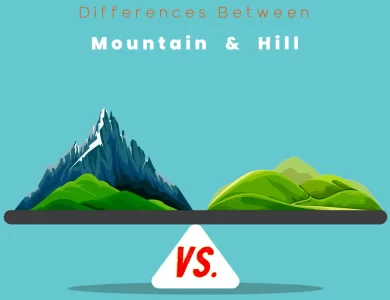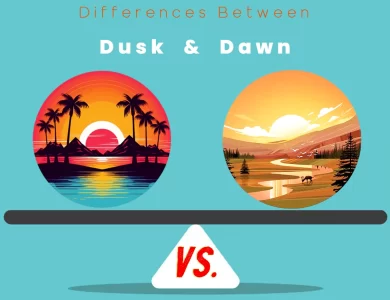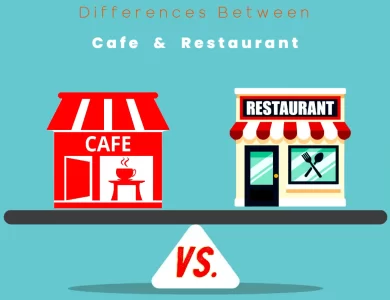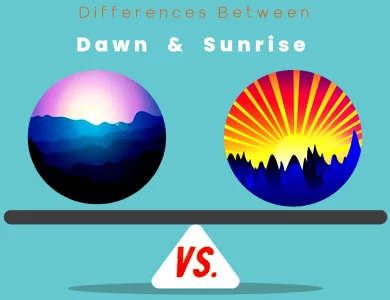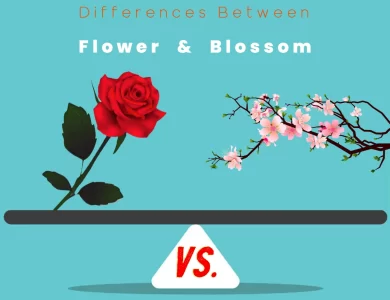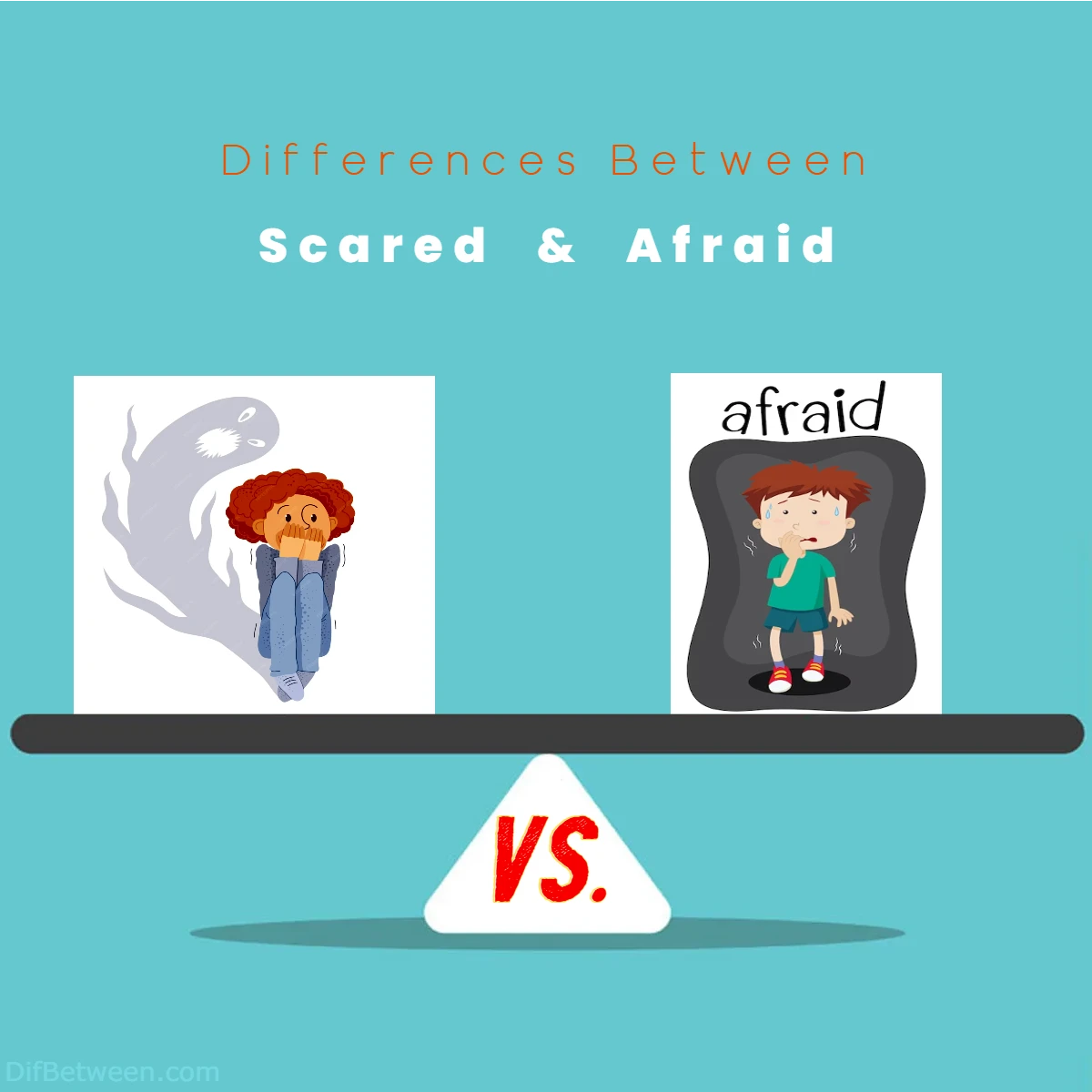
| Aspect | Scared | Afraid |
|---|---|---|
| Definition | Sudden, intense fear | General, lasting fear |
| Scope of Fear | Narrow, specific | Broad, general |
| Duration | Short-term | Long-term |
| Intensity | Intense | Milder |
| Triggers | Immediate, sudden | Anticipated, chronic |
| Emotional Associations | Shock, surprise | Worry, caution |
| Cognitive Aspects | Impulsive | Thoughtful, calculated |
| Coping Mechanisms | Immediate responses | Long-term strategies |
| Physiological Reactions | Fight-or-flight | Chronic stress |
| Impact on Behavior | Impulsive actions | Preventive measures |
| Perceived Control | Reduced control | Potential for control |
| Versatility in Expression | Idiomatic phrases | Idiomatic phrases |
| Cultural Variations | Varies by culture | Varies by culture |
| Real-Life Scenarios | Immediate shock | Long-term concerns |
| Synonyms for Scared | Frightened, terrified | Petrified, panicked |
| Antonyms for Scared | Brave, fearless | Calm, confident |
| Synonyms for Afraid | Anxious, nervous | Worried, apprehensive |
| Antonyms for Afraid | Fearless, bold | Confident, unworried |
Have you ever wondered why you might say, “I’m scared of that horror movie,” but, “I’m afraid of the dark?” The choice of word in such scenarios isn’t mere happenstance; it’s a glimpse into the complex interplay of emotions and language. Whether you’re a passionate wordsmith or simply curious about the intricacies of human expression, our journey today will equip you with a deeper understanding of the “scared” vs. “afraid” conundrum.
Differences Between Scared and Afraid
The main differences between “scared” and “afraid” lie in their scope and duration of fear. “Scared” typically describes a sudden, intense, and narrow fear in response to an immediate and specific trigger, while “afraid” denotes a broader, more generalized, and long-lasting state of fear, often related to anticipated or chronic concerns. Understanding these nuances can help you choose the right term to precisely convey your emotions, whether it’s a momentary startle or a persistent unease.
Understanding the Basics
Before we dive into the nuances, let’s start by establishing a fundamental understanding of both terms:
Scared:
- Definition: “Scared” is an adjective that describes a state of fear or unease, often arising from a sudden or unexpected event. It implies a strong emotional reaction to a perceived threat, danger, or shock.
- Usage: It is commonly used to express a temporary and intense fear. People are scared of things that catch them off guard or evoke a visceral, immediate response.
Afraid:
- Definition: “Afraid” is also an adjective that conveys fear or apprehension, but it typically refers to a more generalized and lasting state of unease. It involves a sense of anticipation and often carries a slightly milder emotional tone compared to “scared.”
- Usage: “Afraid” is often used to express a long-term or chronic fear of something. It is associated with being wary or cautious about potential dangers.
Now that we have the basics down, let’s explore the key differences in greater detail.
Scope of Fear
One of the primary distinctions between “scared” and “afraid” lies in the scope of fear they convey. Understanding this can help you choose the right term for the specific situation you wish to describe.
Scared:
- Narrow Scope: “Scared” is typically used to describe a very specific, immediate fear reaction. It often relates to a specific, sudden, and intense fright caused by a particular event or situation.
Afraid:
- Broad Scope: “Afraid” has a broader scope and is often associated with a more general, ongoing sense of fear or apprehension. It’s not necessarily tied to a single event but can relate to a range of potential threats or anxieties.
Let’s illustrate this difference with a table:
| Aspect | Scared | Afraid |
|---|---|---|
| Scope of Fear | Narrow, specific | Broad, general |
| Duration | Short-term | Long-term |
| Intensity | Intense | Milder |
| Triggers | Immediate, sudden | Anticipated, chronic |
Duration of the Emotion
The duration of fear is another essential factor in distinguishing between “scared” and “afraid.” It relates to how long the emotion persists and whether it is a fleeting or enduring experience.
Scared:
- Short-term: “Scared” is typically associated with short-lived fear, often arising from a sudden and temporary threat. It subsides once the immediate danger or shock has passed.
Afraid:
- Long-term: “Afraid” suggests a longer-lasting or chronic state of fear. This emotion can persist over an extended period, as it relates to an ongoing or anticipated fear.
Here’s a comparison:
| Aspect | Scared | Afraid |
|---|---|---|
| Duration | Short-term | Long-term |
| Persistence | Fleeting, transient | Enduring, chronic |
| Resolution | After immediate threat | Ongoing, unresolved |
Intensity of Fear
The intensity of fear is a crucial factor in understanding the distinctions between “scared” and “afraid.” It refers to how strongly the emotion is felt in each case.
Scared:
- Intense: “Scared” conveys a high level of emotional intensity. It often describes a powerful, immediate reaction to a perceived threat or danger.
Afraid:
- Milder: “Afraid” carries a slightly milder emotional tone compared to “scared.” It implies a less overwhelming or more controlled fear.
Here’s a summary:
| Aspect | Scared | Afraid |
|---|---|---|
| Intensity | Intense | Milder |
| Emotional Tone | Immediate, powerful | Controlled, less intense |
Triggers of Fear
The triggers of fear play a significant role in distinguishing between “scared” and “afraid.” This aspect involves what causes the fear and whether it is linked to a specific event or a more generalized concern.
Scared:
- Immediate, Sudden Triggers: “Scared” is often associated with immediate and unexpected triggers. It can result from a sudden loud noise, a startling event, or a direct threat.
Afraid:
- Anticipated or Chronic Triggers: “Afraid” is tied to anticipated or chronic triggers. It can be the fear of future events, long-term concerns, or persistent anxieties.
To help clarify this difference, let’s use a table:
| Aspect | Scared | Afraid |
|---|---|---|
| Triggers | Immediate, sudden | Anticipated, chronic |
| Examples | Jump scare in a movie | Fear of heights |
| Surprise encounter | Fear of the unknown | |
| A sudden loud noise | Fear of commitment |
Contextual Usage
Understanding when and where to use “scared” or “afraid” is crucial for effective communication. Both terms have specific contexts in which they are most appropriate.
Scared:
- Common Scenarios: Use “scared” in situations involving immediate and intense fear reactions. It’s fitting for storytelling, describing sudden shocks, or conveying the emotional impact of a frightening event.
Afraid:
- Common Scenarios: “Afraid” is more suitable when discussing long-term fears, anxieties, or concerns. It’s often used in everyday conversation to express a general sense of apprehension or worry.
Here’s a comparison to highlight their contextual usage:
| Aspect | Scared | Afraid |
|---|---|---|
| Context | Immediate and intense | General and lasting |
| Usage Examples | “I was scared when I | “I’m afraid of flying.” |
| heard a loud crash.” | “She’s afraid of dogs.” |
Emotional Responses
The emotional responses associated with “scared” and “afraid” also differ, which contributes to their distinctiveness.
Scared:
- Immediate Emotional Response: “Scared” often elicits a quick, intense emotional reaction. It can involve heightened alertness, a racing heart, and a fight-or-flight response.
Afraid:
- Sustained Emotional Response: “Afraid” is more likely to lead to a prolonged emotional state, characterized by ongoing worry, caution, and a sense of vulnerability.
To further illustrate these emotional responses, let’s use a table:
| Aspect | Scared | Afraid |
|---|---|---|
| Emotional Response | Immediate, intense | Sustained, ongoing |
| Physical Signs | Rapid heart rate, | Persistent caution, |
| heightened alertness | vigilance | |
| Behavior | Immediate action, | Continued caution, |
| impulsive reactions | measured response |
Perceived Control
The level of perceived control over the fear is another aspect that distinguishes “scared” from “afraid.” This pertains to whether the person experiencing the emotion feels they can influence or manage it.
Scared:
- Perceived Lack of Control: “Scared” often implies a reduced sense of control over the immediate fear. The intensity and suddenness of the emotion may leave individuals feeling somewhat helpless.
Afraid:
- Potential for Control: “Afraid” may suggest a greater potential for control over the fear, as it is often linked to more general or long-term concerns. People may believe they can take steps to mitigate their fears.
Here’s a comparison to highlight this aspect:
| Aspect | Scared | Afraid |
|---|---|---|
| Perceived Control | Reduced control | Potential for control |
| Feelings | Helplessness, | Proactivity, |
| vulnerability | readiness |
Common Examples
To further clarify the distinctions between “scared” and “afraid,” let’s explore some common examples where each term is more appropriate.
Scared:
- Jump Scares in Movies: When watching a horror movie and a sudden, shocking moment makes you gasp, you can say, “I was scared by that jump scare.”
- Startling Encounters: If you unexpectedly encounter a wild animal while hiking and experience a momentary rush of fear, you can say, “I got scared when I saw the bear.”
- Emergency Situations: When a fire alarm goes off, and you feel a surge of fear and urgency, you might exclaim, “I’m scared! We need to evacuate!”
Afraid:
- Fear of Public Speaking: If you experience ongoing anxiety and worry about speaking in public, you might say, “I’m afraid of public speaking. It makes me nervous.”
- Fear of Flying: When you have a long-standing fear of flying, you can express it as, “I’m afraid to get on airplanes because of my fear of flying.”
- Fear of the Unknown: If you have a general unease about uncertain future events, you could state, “I’m afraid of the unknown. I prefer stability.”
Regional and Colloquial Variations
It’s essential to note that regional and colloquial variations in language can influence the usage of “scared” and “afraid.” In some regions or communities, these terms may be used interchangeably or have slightly different connotations. However, the distinctions outlined in this guide remain a useful reference for understanding the core differences between the two words in standard English.
Emotional Associations
The emotional associations of “scared” and “afraid” are integral to how these terms are perceived and expressed. These associations can differ, affecting the overall tone of the emotions.
Scared:
- Immediate Emotional Impact: “Scared” is often linked to sudden, intense emotional reactions. It’s associated with moments that can make your heart race, cause you to jump, or experience a strong adrenaline rush. The emotional associations can include shock, surprise, and heightened alertness.
Afraid:
- Longer-Term Emotional State: “Afraid” is typically associated with a more prolonged emotional state. It can evoke emotions such as worry, anxiety, caution, and wariness. This term implies a sense of anticipation or apprehension rather than immediate emotional impact.
Cognitive Aspects
Analyzing the cognitive aspects of “scared” and “afraid” reveals how these emotions affect our thought processes and decision-making.
Scared:
- Impulsive Decision-Making: When you’re “scared,” your emotional response often takes precedence, leading to impulsive or instinctive decision-making. It can be challenging to think rationally when in this state.
Afraid:
- Thoughtful and Calculated Responses: Being “afraid” allows for more thoughtful and calculated decision-making. It’s associated with a state of mind where you can weigh the pros and cons of a situation and make choices based on a more rational assessment.
Coping Mechanisms
How individuals cope with “scared” and “afraid” feelings can vary significantly. Understanding these coping mechanisms can shed light on the differences between the two emotions.
Scared:
- Immediate Responses: When “scared,” individuals tend to respond immediately to address the perceived threat or danger. This response can include actions like screaming, running, or taking quick evasive measures.
Afraid:
- Long-Term Strategies: “Afraid” often leads to the development of long-term coping strategies. People who are “afraid” of something may take steps to avoid or mitigate the feared situations over an extended period.
Physiological Reactions
The physiological reactions associated with “scared” and “afraid” are important indicators of how these emotions manifest in the body.
Scared:
- Fight-or-Flight Response: Being “scared” often triggers a classic fight-or-flight response. This physiological reaction includes an increased heart rate, rapid breathing, dilated pupils, and the release of adrenaline to prepare the body for immediate action.
Afraid:
- Chronic Stress Responses: “Afraid” may lead to chronic stress responses in the body. Over time, this can result in persistent stress-related symptoms, such as increased cortisol levels, muscle tension, and insomnia.
Impact on Behavior
Understanding how “scared” and “afraid” influence behavior can provide insights into the differences in their practical implications.
Scared:
- Impulsive Actions: In a “scared” state, individuals are more likely to take impulsive actions, driven by the urgency of the moment. These actions may not always be well-considered.
Afraid:
- Preventive Measures: When “afraid,” individuals are more inclined to take preventive measures to avoid situations or circumstances that trigger their fear. This can lead to long-term avoidance strategies.
Versatility in Expression
Both “scared” and “afraid” can be used in various expressions and idiomatic phrases, each carrying its own connotations.
Scared Expressions:
- Scaredy-Cat: Refers to a person who is easily frightened or timid.
- Scared out of One’s Wits: To be extremely frightened or shocked.
- Scared Stiff: So frightened that one becomes physically rigid or immobile.
- Scared Witless: Completely terrified to the point of mental paralysis.
Afraid Expressions:
- Afraid of One’s Own Shadow: Extremely timid or easily frightened.
- Afraid for One’s Life: In a situation where one fears for their safety or survival.
- Afraid of the Dark: A common childhood fear of darkness or the unknown.
- Afraid of Commitment: A fear of entering into long-term relationships or making significant life commitments.
Synonyms and Antonyms
Understanding synonyms and antonyms of “scared” and “afraid” can further clarify their distinctions:
Synonyms for Scared:
- Frightened
- Terrified
- Panicked
- Startled
- Petrified
Antonyms for Scared:
- Brave
- Unafraid
- Fearless
- Confident
- Calm
Synonyms for Afraid:
- Anxious
- Nervous
- Apprehensive
- Timid
- Worried
Antonyms for Afraid:
- Fearless
- Bold
- Confident
- Unworried
- Reckless
The Role of Language Evolution
Languages are dynamic and subject to change over time. The distinctions between words like “scared” and “afraid” can evolve, and their usage may shift as language and culture evolve. Keeping an eye on how these terms are used in contemporary contexts can provide valuable insights into the evolving nuances of fear-related vocabulary.
In conclusion, “scared” and “afraid” are two closely related emotions, but they differ in terms of emotional associations, cognitive aspects, coping mechanisms, physiological reactions, impact on behavior, versatility in expression, cultural variations, and real-life scenarios. Understanding these distinctions allows for precise communication and a better grasp of the complexities of human emotions. Whether you’re describing an immediate, heart-pounding response to a horror movie or a long-standing unease about a life situation, the choice between “scared” and “afraid” can significantly impact how your feelings are conveyed to others.
FAQs
The key distinction between “scared” and “afraid” lies in the scope and duration of fear. “Scared” typically refers to a sudden, intense, and specific fear in response to an immediate trigger, whereas “afraid” indicates a broader, more generalized, and long-lasting state of fear, often tied to anticipated or chronic concerns.
While “scared” and “afraid” are often used interchangeably in everyday conversation, they carry nuanced differences in meaning and usage. To communicate your emotions with precision, it’s helpful to consider these distinctions.
When you’re “scared,” you’re more likely to react impulsively, driven by the urgency of the moment. In contrast, when you’re “afraid,” you tend to exhibit more thoughtful and calculated responses, as this emotion is associated with long-term concerns.
Yes, cultural perspectives and idiomatic usage can introduce variations in how “scared” and “afraid” are interpreted and expressed. Different cultures may have unique idiomatic phrases that convey fear using one term more than the other.
Understanding the distinctions between “scared” and “afraid” allows for more precise and empathetic communication. It enables you to convey the depth of your emotions accurately in different situations, enhancing your ability to connect with others.
Yes, each term has synonyms and antonyms. Synonyms for “scared” include “frightened” and “terrified,” while for “afraid,” they include “anxious” and “nervous.” Antonyms for “scared” could be “brave” and “fearless,” while for “afraid,” they include “confident” and “unworried.”
Yes, both “scared” and “afraid” have idiomatic expressions that use them. For example, “scaredy-cat” refers to someone easily frightened, and “afraid of one’s own shadow” suggests extreme timidity. Understanding these idiomatic expressions can help navigate the subtleties of their usage.
Read More:
Contents
- Differences Between Scared and Afraid
- Understanding the Basics
- Scope of Fear
- Duration of the Emotion
- Intensity of Fear
- Triggers of Fear
- Contextual Usage
- Emotional Responses
- Perceived Control
- Common Examples
- Regional and Colloquial Variations
- Emotional Associations
- Cognitive Aspects
- Coping Mechanisms
- Physiological Reactions
- Impact on Behavior
- Versatility in Expression
- Synonyms and Antonyms
- The Role of Language Evolution
- FAQs

